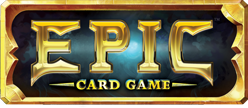Playing Epic with decks you create yourself is a challenging, creative way to express yourself through play. It is also the least forgiving. A well-tuned deck can punish an opponent’s misplay decisively. Bring your ‘A’ game for this format!
Full Constructed
- Each player builds a deck from their own Epic card collection.
- Decks must contain at least 60 cards, with no more than three copies of each card.
- For each 0-cost card of an alignment, the deck must contain at least two 1-cost cards of the same alignment. (For example, a deck with seven 0-cost sage cards must have at least fourteen 1-cost sage cards.)
For sanctioned tournaments, promotional cards are not allowed until they have been released in a product for sale at retail. As of now, only the cards released in the Epic set one and Epic Tyrants are allowed; the organized play cards and the Kickstarter promo cards are not allowed. (Those cards are projected for sale in 2017.)
This is a format we use in our World Championship Qualifiers and in the championship itself.
Singleton Constructed
- Each player builds a deck from their own Epic card collection.
- Decks must contain at least 30 cards, with no more than one copy of each card.
- For each 0-cost card of an alignment, the deck must contain at least two 1-cost cards of the same alignment. (For example, a deck with seven 0-cost sage cards must have at least fourteen 1-cost sage cards.)
We do not have plans to sanction events in this format. If we do, promotional cards are not allowed until they have been released in a product for sale at retail.
Preconstructed (2-4 players)
Each Epic set contains four Preconstructed decks. Simply separate all of the cards by color, and you have four balanced decks!
Hero’s Journey (2 players)
- Each player makes a deck of 60 cards. One player uses all 30 cards from two alignments in the base game, and their opponent get the cards from the other two alignments.
- Play two games, with each player going first once.
- Record wins on a sheet similar to this one.
- Repeat this process, randomly choosing other alignment pairs for player 1 each time until all 6 pairs have been used.
- The winner is the first person to reach 7 game wins. (If you play all 12 games and end up 6-6, it is a draw!)
This format takes a long time to play. When we played this format in the office, we would generally play a series over several days of lunch breaks. If you are looking to explore the depths of strategic gameplay the base game of Epic has to offer, the Hero’s Journey is for you!

Recent Comments